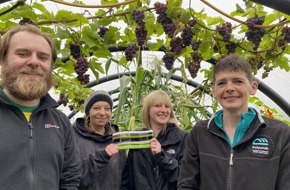Highlights
- The company started as a community growing project run by the Northmavine Community Development Company, supported by the Climate Challenge Fund.
- They initially built 12 undercover growing spaces across Northmavine.
- Polycrub is designed to withstand the Shetland climate.
- Polycrub utilise strong plastic piping that is a waste material from the aquaculture sector.
- Initially they sold across Shetland, and interest from elsewhere led to the development of distribution “hubs”.
- Polycrubs are now sold across Shetland, the Western Isles, the Highlands and to customers as far afield as France, Greenland and the Falkland Islands.
- Profits are invested in sustainable community projects across Northmavine.

Back in 2007, Northmavine Community Development Company (NCDC) was undertaking a number of carbon reduction projects identified by the community. One such project was a community growing project to reduce food miles and give people better access to fresh fruit and vegetables.
The aim was, with the help of funding from the Climate Challenge Fund (CCF), to build 12 undercover growing spaces at various locations throughout Northmavine. NCDC could not find structures that would withstand the Shetland climate, long-term, so they decided to develop their own. A group at NCDC looked at several ideas in Shetland and went on to develop what ultimately became the Polycrub.
NCDC was particularly keen to work with the aquaculture industry to reuse and recycle their waste plastic pipe, as this had been littering seashores or was sent to landfill. A design incorporating the plastic pipe was developed and NCDC secured CCF funds.
The twelve Polycrubs were built and almost 50 people had access to a shared, sheltered growing space. This was to be the end of the project.
The design attracted lots of interest from growers who wanted to own a similar structure. NCDC realised there was business potential. In 2011, a trading arm was formed (nortenergy Ltd – The Polycrub Company) and designs were developed for a range of Polycrubs of differing sizes.
Polycrubs sold well in Shetland to individuals and community groups. In addition to providing fresh produce and better diets for people, the Polycrub was helping to reduce food miles and reduce carbon. Folk holidaying in Shetland also began to notice these robust growing spaces and wanted to purchase their own, so the business developed and grew.
Potential customers were attracted to the strength of the Polycrub ‘Well, if can withstand the Shetland weather, it’ll withstand anything’, was often heard, but also people were pleased to support an initiative that recycled the waste plastic pipe.
Further improvements were made to the designs and an independent team of engineers gave the Polycrub structural accreditation to wind speeds of 120 miles per hour.
The Polycrub Company now employs five people and has two distribution hubs out with Shetland, bringing Polycrubs nearer to national markets. These hubs provide economic benefits to small businesses with similar values to the Polycrub Company. Further plans are in place to grow sales and add further distribution hubs on the mainland.
Turnover has increased year on year and in 2020 topped a million pounds. International sales include customers in France, Greenland and the Falklands.
Based on average sales, around 3.2 hectares of land is now under cover of Polycrub. The amount of fresh produce grown in Polycrubs is estimated to be at 45 tonnes per year. The amount of plastic aquaculture pipe diverted from landfill, to date, could easily stretch from one end of mainland Shetland to the other.
The Polycrub Company is a social enterprise, a company limited by shares with all shares owned by NCDC. All profits are returned to NCDC to be used for the benefit of Northmavine. In 2020, the company returned around £70k.
One such use of the funds to NCDC for the benefit of the local community is the creation of ‘Bruckland’, a community waste and recycling project in Northmavine. Local people can bring bulky household waste to the site, for disposal. A large majority of the items are then recycled/repurposed/reused by folk in the community and the wider Shetland area.
In terms of the Polycrub Company, it is gratifying to see that a project that started as a Climate Challenge Fund project has now, in turn, resulted in other community groups accessing CCF funds to purchase Polycrubs for their own carbon reduction/access to fresh produce projects.
Each Polycrub sold is accompanied by a peerie undercover growing book. This was produced with the help of the local primary school pupils. A number of books were donated to the school, which they were able to sell for school funds. The school, like many more in Shetland and beyond, now has a Polycrub too.